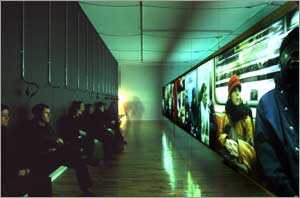
Julia Loktev Said In Passing 2000
This exhibition, the second in the Untitled 2004 series, introduces three international artists, Julia Loktev, Julika Rudelius and Cui Xiuwen, who adopt the style of documentary film-making to explore private experience in public places. This is the first exhibition of their work in Britain.Combining realism with fiction, Julia Loktev's film Said in Passing (2000) consists of five video screens showing twenty different women travelling on the New York subway, each offering personal commentaries (heard on an accompanying soundtrack) that appear to present their 'real' characters to the audience. In fact, Loktev chose the women to play the parts, asking them to respond to a list of intimate questions. By presenting verbal profiles that are inconsistent and semi-fictional (it was left to the women to decide whether to answer the questions truthfully or not), the film suggests that self-revelation is inherently contradictory. Returning to the installation at different moments in its cycle we find another journey and a completely different set of portraits, echoing the anonymous, fragmented nature of encounters in the metropolis. While Loktev's semi-documentary narratives reflect on the individual construction of identity in a city in perpetual motion, Cui Xiuwen's video Ladies (2000) documents a society undergoing rapid transition. Using a hidden camera to film behind the scenes in the toilets of a glitzy Beijing 'escort' club, Cui confronts female sexuality in modern China. Low-fi surveillance technology records young women over the course of an evening as they come and go in front of the nightclub's bathroom mirror. The footage is edited to create an orchestrated series of repetitive performances that gradually reveal the nature of the women's occupation. We watch them unselfconsciously adjusting their bras, applying make-up and changing outfits and then, in the last moments of the video, we eavesdrop on their mobile phone negotiations with 'clients' and see the evening's earnings being counted and carefully hidden. Cui reveals how the private space of the bathroom becomes simultaneously a site of economic exchange and a refuge for the women.Julika Rudelius' video Looking at the other/desire (2003) is projected against the window of the gallery, and is viewed from outside. It records three teenagers hanging out in a park in Amsterdam, oblivious to the scrutiny of city dwellers and surveillance cameras alike. While two of the kids intimately embrace, the third nonchalantly smokes a cigarette as he tries unsuccessfully to gain the attention of his preoccupied friends. The work plays on the idea of the romantic idyll, and by focusing on the body language of the three, investigates group dynamics and culturally-shaped patterns of behaviour.
Although Rudelius employs methods and styles associated with documentary film-making, such as interviews and surveillance, she is also interested in the way events are reconstructed in the editing process. In other films she has staged the action, basing it on previously observed scenes, so that the viewer is left questioning the veracity of the apparently 'eye-witness' footage. Today's society seems gripped by its desire for 'real life' stories, as evidenced by the ever-increasing reach of reality TV, candid camera, CCTV, and web surveillance. The supposed 'transparency' of such documentary forms, however, belies their potential for manipulation. It is these blurred areas between 'authentic' documentary styles and staged or edited imagery that the three works in this exhibition explore.
Artist biographies
Julia Loktev
(born 1969, St. Petersburg, Russia) lives and works in New York. Her work has been exhibited in America and Europe and featured at various international film festivals. She received the award for best documentary direction at the 1998 Sundance Film Festival for Moment of ImpactĚý1998.
Julika Rudelius
(born 1968, Cologne, Germany) lives and works in Amsterdam where she is represented by Galerie Diana Stigter. She has exhibited widely in Europe, and her video installation Tagged 2003 was displayed at this year's Liste 04, Art Basel.
Cui Xiuwen
(born 1970, Heilongjiang, China) lives and works in Beijing. Recent exhibitions of her work include Alors, la Chine? at Centre Georges Pompidou (2003) and Prague Biennale 1 (2003).
